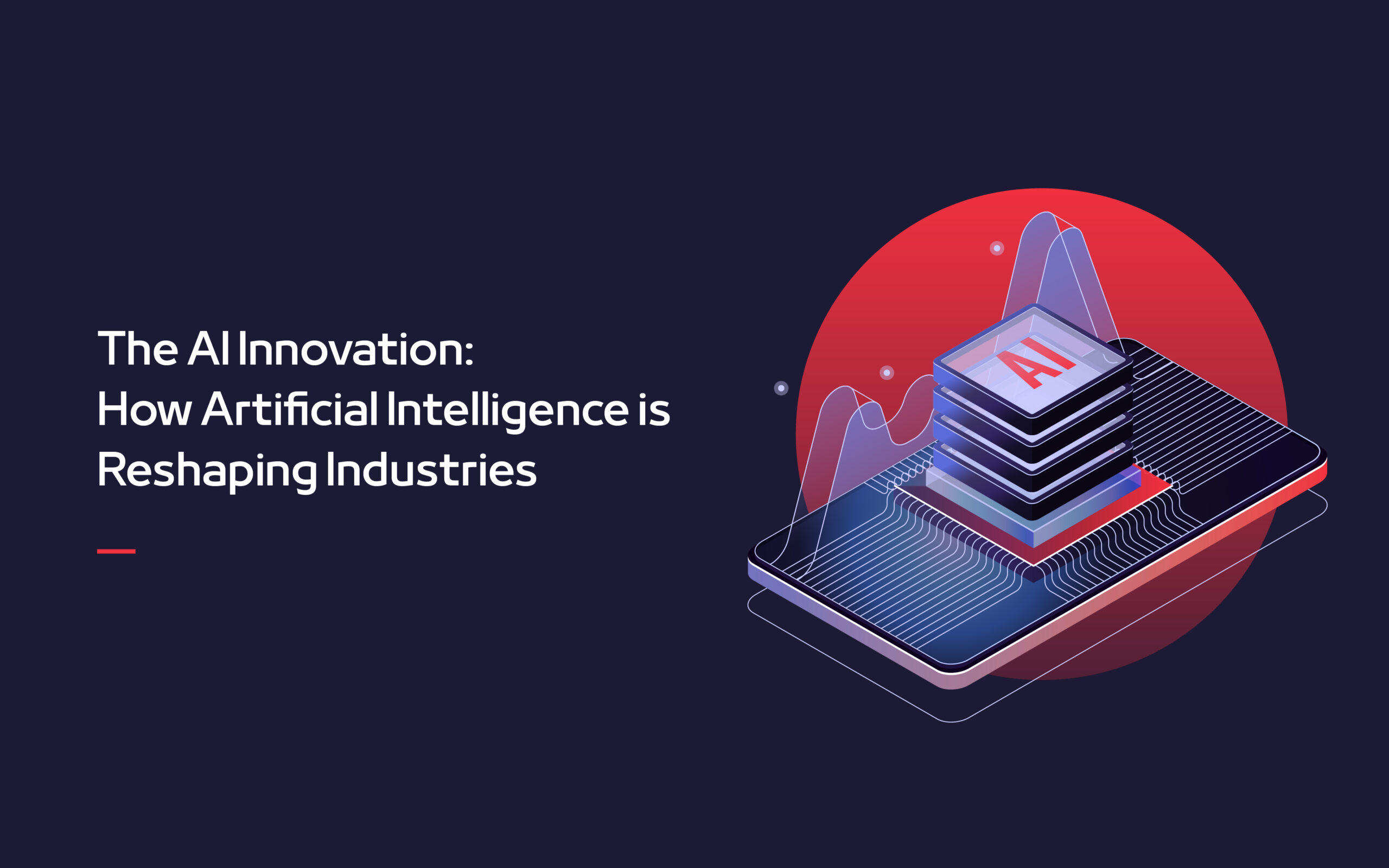
The AI Innovation: How Artificial Intelligence is Reshaping Industries
Within a short period, generative Artificial Intelligence (AI) has emerged as potentially the most transformative technology of our time, reshaping various sectors, from entertainment to education and healthcare, and changing the way we work, live, and interact with the world.
AI’s pervasive impact is increasingly evident, poised to touch virtually every aspect of human life, from the workplace to daily interactions. While concerns persist about its potential to replace jobs, the broader outlook suggests a more positive net effect. As a significant driver of productivity, AI stands to catalyze wealth creation and open new avenues of opportunity. By augmenting roles and tasks, it enables individuals to achieve more in less time. Embracing its transformative potential necessitates a collective commitment to upskilling and adapting our competencies, preparing us to proactively leverage AI’s capabilities and maximize its benefits.
The global AI market size was valued at USD 428.00 billion in 2022 and is projected to grow from USD 515.31 billion in 2023 to USD 2,025.12 billion by 2030. AI emerged as the fastest-growing category on Upwork, one of the world’s leading freelancing platforms, in the initial half of 2023. In the second quarter of this year, job postings worldwide related to generative AI witnessed an astonishing growth rate of over 1000% compared to the same period last year, while searches related to AI surged by an impressive 1500% within the same timeframe. The World Economic Forum projects that AI will contribute to the creation of 97 million new job opportunities by the year 2025.
According to Microsoft, 82% of global business leaders anticipate that employees will require new skill sets to thrive in an “AI-driven future.” The report highlights the top three skills identified by these leaders as indispensable: analytical judgment, adaptability, and emotional intelligence. Microsoft emphasizes that these competencies are no longer confined to technical roles or AI specialists; instead, they have become the bedrock of essential skills for all professionals in the evolving landscape.
Below, we look at some of the sectors that are enhancing their performance with AI globally, and how that can extend to Bahrain’s economy.
Healthcare: Revolutionizing Patient Care
Thanks to AI, diagnosis and treatment are becoming more precise, and the delivery of medical care is quickly becoming increasingly personalized. AI algorithms can analyze vast amounts of patient data to identify patterns and predict disease outcomes. Medical imaging, such as MRI and CT scans, benefits from AI-powered tools that enhance accuracy and speed. The result? Improved patient outcomes and reduced healthcare costs. With the demographic shift toward older populations across the world, AI will play a pivotal role in enhancing healthcare outcomes and managing costs.
According to Statista estimates, the artificial intelligence (AI) healthcare market, valued at $11 billion in 2021, is projected to be worth $187 billion in 2030. That massive increase means we will likely see profound changes in how medical providers, hospitals, pharmaceutical and biotechnology companies, and others in the healthcare industry operate.
In 2020, Bahrain took a significant step by introducing its inaugural telemedicine license and associated guidelines. Furthermore, Bahrain’s virtual care sector is poised for a substantial boost with its impending integration into the network of Saudi Arabia’s SEHA Virtual Hospital. This historic move, marking the Middle East’s first of its kind, promises to enhance Bahrain’s healthcare offerings, providing advanced access to remote medical services for its residents.
Finance: Enhancing Decision-Making and Security
In the dynamic landscape of finance, the integration of Artificial Intelligence (AI) has brought forth a multitude of advantages. From bolstering decision-making processes and fortifying security measures to enhancing customer experiences and enabling efficient trading, AI has reshaped the financial sector. Its ability to analyze data, detect fraud, and provide personalized solutions has transformed the way institutions approach risk assessment, investment strategies, and customer interactions, leading to a more streamlined and responsive financial ecosystem.
Bahrain’s Financial Services sector is the largest non-oil sector in the economy contributing 17.5% towards real GDP in 2022. AI-driven financial advisors can be developed to enhance the predictive capabilities of financial service institutions, enabling them to better anticipate customer requirements. These AI-powered advisors can also offer personalized tools and human-like chatbot support, thereby enhancing the overall customer experience.
Moreover, the emergence of AI-driven financial advisors is poised to revolutionize traditional business models, leading to more cost-effective service delivery, smarter decision-making processes, and an expanded array of choices for consumers. This transformation is set to impact various aspects of the financial sector, including trading, asset management, savings, and insurance delivery, fostering a more tailored and accessible approach to investment management while concurrently optimizing operational efficiency and reducing costs.
Manufacturing: Boosting Efficiency and Automation
Manufacturing is embracing AI through smart factories and predictive maintenance. Machines equipped with AI can monitor themselves, schedule maintenance when needed, and minimize downtime. Quality control and supply chain optimization benefit from AI’s analytical capabilities, leading to increased productivity and reduced waste.
Some key findings on the role of AI in manufacturing are:
- 83% of organizations believe AI will play a significant role in their digital transformation
- 24% of manufacturing companies use AI for assembly and quality testing
- 79% of organizations have a live industrial AI or are piloting a project
Bahrain is home to a diverse manufacturing sector, with several established heavy industries and a growing cluster in light manufacturing. The sector is the second largest contributor to the Kingdom’s non-oil real GDP (behind Financial Services) and employs 10% of the total workforce in the private sector with a Bahrainization rate of 24.7%. Furthermore, the Kingdom of Bahrain recently launched “iFactories”, a national initiative that aims to support the movement of the industrial sector towards the Fourth Industrial Revolution, championed by the Ministry of Industry and Commerce and the Labour Fund (Tamkeen).
AI presents the opportunity to improve operational efficiencies and target higher-value manufacturing sectors. In addition, digital supply networks and data analytics can be powerful enablers for more flexible, multitiered responses to supply chain disruptions. It can also help companies achieve their ESG (Environmental, Social and Governance) targets by increasing efficiency and making processes more sustainable.
Transportation and Logistics: Paving the Way for Autonomous Vehicles and More
AI in the transportation sector can improve everyday life in many ways, starting from more comfortable and convenient traffic management and passenger safety to carbon emissions reduction. The global AI in transportation market size was valued at USD 3 billion in 2022 and is expected to reach around USD 23.11 billion by 2032, poised to grow at a compound annual growth rate of 22.70% over the forecast period 2023 to 2032.
Bahrain’s transportation and logistics sector has a rich history due to the Kingdom’s past as a trading hub, and contributed 6.8% of GDP in 2022. The Kingdom is investing in major infrastructure projects which are expected to drive growth in the sector, including the Bahrain Metro project.
Bahrain’s compact size makes it the perfect testing ground for innovative AI solutions to manage traffic flow. Successful implementation can significantly boost the logistics industry by facilitating optimal route adjustments and minimizing waiting times. The growing adoption of AI technology is expected to not only streamline operations but also lead to significant labor cost reductions, ultimately contributing to enhanced profitability.
In conclusion, artificial Intelligence is reshaping industries in profound ways. As AI continues to advance, it is essential to stay informed about its potential impacts on various sectors. The AI revolution is here, and it is transforming the world as we know it.

